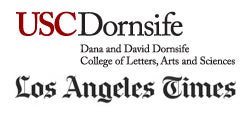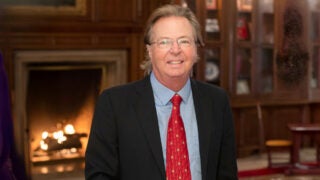USC Dornsife/LA Times Poll: Two Democrats share lead over Republicans in Calif. Senate race
 California could choose between two Democrats in November — the first time in history for a statewide congressional race, the USC Dornsife/Los Angeles Times poll shows.
California could choose between two Democrats in November — the first time in history for a statewide congressional race, the USC Dornsife/Los Angeles Times poll shows.
Results on issues such as health care, minimum wage and transgender bathrooms will be released next week. A press call discussing results is MONDAY, June 6, at 10 a.m. PT. Call-in spots are limited. RSVP to gersema@usc.edu.
Contact: Emily Gersema at (213) 361-6730 or gersema@usc.edu or Erika Maldonado at (213) 740-8964 or erikamal@usc.edu; or Dan Schnur at schnur@usc.edu or (213) 740-8964
June 3, 2016 — Two Democrats have maintained a wide lead in the race for the U.S. Senate seat in California, raising the possibility that none of the Republican candidates will advance to the general election, according to the latest USC Dornsife/Los Angeles Times poll.
The poll showed Attorney General Kamala Harris leads among likely voters with 29 percent, followed by Democratic candidate Loretta Sanchez with 15 percent. The two women share a sizable lead over the three leading Republicans in the race. Among likely voters, business attorney Tom Del Beccaro is the closest but trails Sanchez by 9 percentage points with 6 percent, followed by George “Duf” Sundheim with 5 percent, and former publisher Ron Unz with 4 percent.
Thirty-four percent of Republican voters are undecided.
Overshadowed by the presidential race, the Senate campaign is drawing extremely low levels of interest from Californians. Only half of likely voters said they are following the Senate race, while 29 percent said they care “just a little” and 20 percent don’t care at all. Those who don’t care much or at all said they are mostly interested in the presidential race or they don’t have time.
“The U.S. Senate race has become the abandoned stepchild of the California primary,” said Dan Schnur, director of USC’s Jesse M. Unruh Institute of Politics. “The presidential campaign has attracted such a high level of interest that the Senate candidates have barely been noticed.”
In California, the two candidates garnering the most votes in the primary advance to the general election — regardless of party affiliation. Same-party candidates have moved onto the general election in approximately two dozen congressional and legislative campaigns since the “top two” system was implemented before the 2012 election. If Harris and Sanchez advance, it would mark the first time the situation has occurred in a campaign for statewide office.
“Because there are still such large numbers of undecided Republican voters in this race, it’s still possible for one of the GOP candidates to finish second and move on to the general election. But it’s very unlikely,” said Schnur. “The question in the fall isn’t whether California will send a Democrat to the U.S. Senate, but which one.”
Harris leads among the voters likely to participate in the Senate primary with 34 percent, compared with Sanchez at 14 percent.
Sanchez’s appeal is strongest among Latinos. She also is favored by younger voters, drawing 31 percent from 18 to 29 year olds, versus Harris with 16 percent. But Harris draws support from white and African American voters, and fares well with older voters who are known for higher turnout than the younger generations. Harris has the support of 31 percent of those aged 50 to 64, and 30 percent of those aged 64 or older.
Harris also appeals to 55 percent of the Senate Primary voters who support Democratic presidential candidate Hillary Clinton. Sanchez draws 52 percent of those who back Democratic presidential candidate Bernie Sanders.
Most California voters said they are open to having candidates from the same party in the top two spots for the general election. Thirty-eight percent of voters felt it is very important to have the two highest-vote earners advance to the general election in November, compared with 31 percent who would like to be able to choose from a Republican and a Democrat.
Additional poll results and methodology are available here.
About the USC Dornsife College of Letters, Arts and Sciences/Los Angeles Times Poll: The USC Dornsife/Los Angeles Times Poll is a series of statewide public opinion polls in California, designed to survey voter attitudes on a wide range of political, policy, social and cultural issues.
Conducted at regular intervals throughout the year, the USC Dornsife/Los Angeles Times Poll is the largest statewide poll of registered voters and has been widely cited, helping to inform the public and to encourage discourse on key political and policy issues.
About the Jesse M. Unruh Institute of Politics: The Jesse M. Unruh Institute of Politics is dedicated to bridging the academic study of politics with practical experience in the field. The Unruh Institute channels its efforts by offering courses in applied politics, a variety of speaker series, and an extensive political internship program. Its goals are to engage public officials with the USC community and to facilitate the discussion of relevant issues across campus.
About USC Dornsife College of Letters, Arts and Sciences: USC Dornsife College of Letters, Arts and Sciences is the heart of the university. The largest, oldest and most diverse of USC’s 19 schools, USC Dornsife is composed of more than 30 academic departments and dozens of research centers and institutes. USC Dornsife is home to approximately 10,000 undergraduate and graduate students and more than 750 faculty members with expertise across the humanities, social sciences and sciences.
About the Los Angeles Times: The Los Angeles Times is the largest metropolitan daily newspaper in the country, with a daily readership of 2 million and 3 million on Sunday, and a combined print and interactive local weekly audience of 4.5 million. The fast-growing latimes.com draws over 10 million.
# # #



